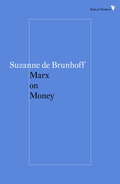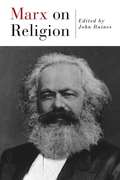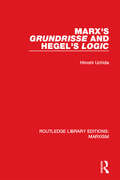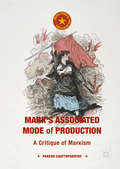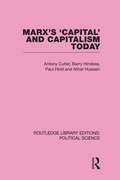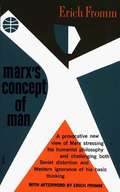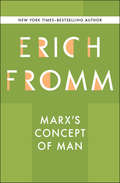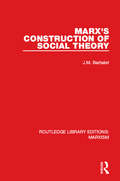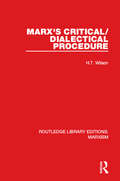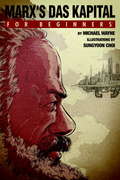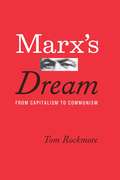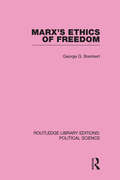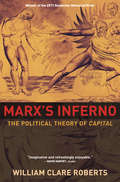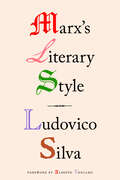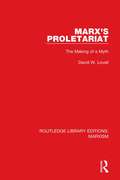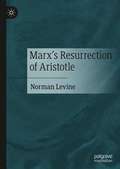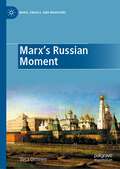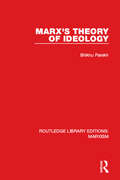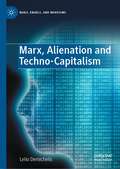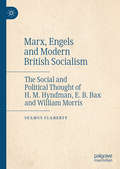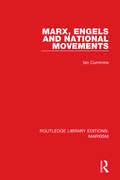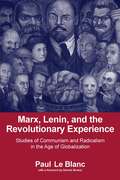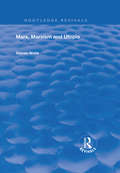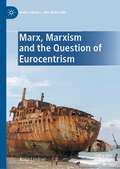- Table View
- List View
Marx on Money
by Suzanne De BrunhoffThe republication of Suzanne de Brunhoff's classic investigation into Karl Marx's conception of "the money commodity" shines light on commodities and their fetishism. The investigation of money as the crystallization of value in its material sense is central to how we understand capitalism and how it can be abolished. Marx on Money is an elegant analysis of how money, credit, debt and value fit into the "logic of capital" that characterizes commodity society.From the Trade Paperback edition.
Marx on Religion
by John RainesReligious suffering is at one and the same time the expression of real suffering and a protest against real suffering. Religion is the sigh of the oppressed creature, the heart of a heartless world and the soul of soulless conditions. Few people would ever expect that Karl Marx is the writer of the above statement. He not only wrote it, but he did so in the same breath of his more famous dictum that "religion is the opiate of the masses. " How can one reconcile such different perspectives on the power and ubiquity of religion?In this compact reader of Marx's essential thought on religion, John Raines offers the full range of Marx's thoughts on religion and its relationship to the world of social relations. Through a careful selection of essays, articles, pamphlets, and letters, Raines shows that Marx had a far more complex understanding of religious belief. Equally important is how Marx's ideas on religion were intimately tied to his inquiries into political economy, revolution, social change, and the philosophical questions of the self. Raines offers an introduction that shows the continuing importance of the Marxist perspective on religion and its implications for the way religion continues to act in and respond to the momentous changes going on in our social and environmental worlds. Marx on Religion also includes a study guide to help professors and students-as well as the general reader-continue to understand the significance of this often under-examined component of Marx.
Marx's 'Grundrisse' and Hegel's 'Logic' (Routledge Library Editions: Marxism #20)
by Hiroshi UchidaMarx’s Grundrisse is acknowledged as the vital link between Marx’s early and late work. It is also a crucial text in elucidating Marx’s debt to the idealist philosopher G.W.F. Hegel. This book, first published in 1988, is the first full-length study of that relationship, in a thorough textual analysis which makes the connections explicit and also the Grundrisse’s relations to the works of Adam Smith and Aristotle. This book argues that Marx’s critique of political economy, and his critique of Hegel, are double interrelated. Not only did Marx adapt Hegelian logic in order to analyse the economic categories crucial to modern society but it is argued that those logical categories were themselves seen as reflections of the productive processes of contemporary commercial society. Uchida reveals a conceptual structure common to the apparently rarefied world of Hegelian conceptual logic and to the supposedly common-sensical world of economic science. Demonstrating this is a considerable achievement, and it allows us to consider precisely what is valuable today in Marx’s critical commentary on this conceptual structure and on the type of society in which it is manifested. Uchida’s subject, like Marx’s, is ‘the force of capital on modern life’.
Marx's Associated Mode of Production: A Critique of Marxism (Marx, Engels, and Marxisms)
by Paresh ChattopadhyayThis book aims to restore Marx’s original emancipatory idea of socialism, conceived as an association of free individuals centered on working people’s self- emancipation after the demise of capitalism. Marxist scholar Paresh Chattopadhyay argues that, Marx’s (and Engels’s) ideas have been deliberately warped with misinterpretation not only by those who resent these ideas but more consequentially by those who have come to power under the banner of Marx, calling themselves communists. This book challenges those who have inaccurately revised Marx’s ideas justify their own pursuit of political power.
Marx's Capital and Capitalism Today (Routledge Library Editions: Political Science #52)
by Tony Cutler Barry Hindess Athar Hussain Paul Q.HirstThis volume is concerned with the re-evaluation and criticism of Capital itself. It is in three parts, each covering a specific area of Marxist theory. The first part contains an investigation into Marx’s theory of value and considers the types of questions and modes of analysis to which this theory leads. In the second part the nature and implications of necessary economic ‘laws of tendency’ in the capitalist mode of production are covered. Finally there is an analysis of the role of class structure and economic agents in Marxist theory.
Marx's Concept of Man
by Erich H. FrommA provocative new view of Marx stressing his humanist philosophy and challenging both Soviet distortion and Western ignorance of his basic thinking.
Marx's Concept of Man: Including 'economic And Philosophical Manuscripts' (Bloomsbury Revelations Series)
by Erich FrommAn exploration of how Marx&’s ideas have been misused and misunderstood, from the New York Times–bestselling author of Escape from Freedom. In the Western world, and especially in the United States, Karl Marx is perceived as the spiritual godfather of Lenin and Stalin—someone bent on creating a state where everyone worships a centralized bureaucracy. Social philosopher Erich Fromm argues that Marx has been entirely misrepresented and misunderstood, and that Marx&’s ideas have been misappropriated to further causes antithetical to his true intentions. Fromm&’s study presents Marx as a humanist and social scientist. Painstakingly traveling through Marx&’s oeuvre, Fromm shows how Marx&’s real goal was to eliminate man&’s alienation, and allow individuals to live and appreciate a life of freedom. Furthermore, Fromm believes, Marx would have considered the Communist governments of Russia and Cuba as wrong-headed. Marx&’s Concept of Man also includes a selection of Marx&’s Early Writings, brought to English-speaking readers for the first time in 1961. This ebook features an illustrated biography of Erich Fromm, with rare images and never-before-seen documents from the author&’s estate.
Marx's Construction of Social Theory (Routledge Library Editions: Marxism #18)
by J.M. BarbaletThis study, first published in 1983, explores the connections between Marx’s philosophy and his empirical analysis of society and state, by showing the different meanings of many of Marx’s concepts as their role in his theory changes and the theory itself develops. Beginning with an examination of Marx’s search for a sound epistemological basis on which to build a social theory, Dr Barbalet then gives an analysis of the way in which Marx continually modifies the concepts he uses, and continues with an examination of the different functions they are given in different theoretical settings. Various nuances of Marx’s thought, often obscured by the simplistic ‘early-late’ dichotomy, are revealed by Dr Barbalet’s close attention to the progressive transformation of Marx’s concepts and by his scrupulous analysis of them in not only their textual but also their theoretical context. Finally, the book examines the manner in which Marx’s construction of social theory, by its very nature, means that some material is replaced by other theoretical fabric as the theoretical structure itself is in different ways dismantled and reorganised, as Marx’s thought evolves and develops.
Marx's Critical/Dialectical Procedure (Routledge Library Editions: Marxism #19)
by H.T. WilsonThis book, first published in 1991, demonstrates that Marx is the legitimate founder of what was to become the critical theory of society. It argues that in order to justify a new conception of humans as collective, cultural and historical beings, Marx undertook a radical critique of the theoretical/analytical method of his predecessors and his contemporaries in political economy, philosophy and the natural sciences. While elements of the methods of some of these thinkers – most conspicuously from the work of Aristotle, Kant and Hegel – were present in Marx’s thought, he achieved a new synthesis of procedural, epistemological and ontological methods.
Marx's Das Kapital For Beginners
by Michael Wayne Sungyoon ChoiMarx's Das Kapital cannot be put into a box marked "economics." It is a work of politics, history, economics, philosophy and even in places, literature (yes Marx's style is that rich and evocative). Marx's Das Kapital For Beginners is an introduction to the Marxist critique of capitalist production and its consequences for a whole range of social activities such as politics, media, education and religion. Das Kapital is not a critique of a particular capitalist system in a particular country at a particular time. Rather, Marx 's aim was to identify the essential features that define capitalism, in whatever country it develops and in whatever historical period. For this reason, Das Kapital is necessarily a fairly general, abstract analysis. As a result, it can be fairly difficult to read and comprehend. At the same time, understanding Das Kapital is crucial for mastering Marx's insights to capitalism. Marx's Das Kapital For Beginners offers an accessible path through Marx's arguments and his key questions: What is a commodity? Where does wealth come from? What is 'value'? What happens to work under capitalism? Why is crisis part of capitalism's DNA? And what happens to our consciousness, our very perceptions of reality and our ways of thinking and feeling under capitalism? Understanding and learning from Marx's work has taken on a fresh urgency as questions about the sustainability of the capitalist system in today's global economy intensify.
Marx's Dream: From Capitalism to Communism
by Tom RockmoreTwo centuries after his birth, Karl Marx is read almost solely through the lens of Marxism, his works examined for how they fit into the doctrine that was developed from them after his death. With Marx’s Dream, Tom Rockmore offers a much-needed alternative view, distinguishing rigorously between Marx and Marxism. Rockmore breaks with the Marxist view of Marx in three key ways. First, he shows that the concern with the relation of theory to practice—reflected in Marx’s famous claim that philosophers only interpret the world, while the point is to change it—arose as early as Socrates, and has been central to philosophy in its best moments. Second, he seeks to free Marx from his unsolicited Marxist embrace in order to consider his theory on its own merits. And, crucially, Rockmore relies on the normal standards of philosophical debate, without the special pleading to which Marxist accounts too often resort. Marx’s failures as a thinker, Rockmore shows, lie less in his diagnosis of industrial capitalism’s problems than in the suggested remedies, which are often unsound. ? Only a philosopher of Rockmore’s stature could tackle a project this substantial, and the results are remarkable: a fresh Marx, unencumbered by doctrine and full of insights that remain salient today.
Marx's Ethics of Freedom (Routledge Library Editions: Political Science #49)
by George G BrenkertThis book reveals Marx’s moral philosophy and analyzes its nature. The author shows that there is an underlying system of ethics which runs the length and breadth of Marx’s thought. The book begins by discussing the methodological side of Marx’s ethics showing how Marx’s criticism of conventional morality and his views on historical materialism, determinism and ideology are compatible with having an ideological system of his own. In the light of contemporary social, moral and political philosophy the insights and defects of Marx’s major ethical themes are discussed.
Marx's Inferno: The Political Theory of Capital
by William Clare RobertsMarx’s Inferno reconstructs the major arguments of Karl Marx’s Capital and inaugurates a completely new reading of a seminal classic. Rather than simply a critique of classical political economy, William Roberts argues that Capital was primarily a careful engagement with the motives and aims of the workers’ movement. Understood in this light, Capital emerges as a profound work of political theory. Placing Marx against the background of nineteenth-century socialism, Roberts shows how Capital was ingeniously modeled on Dante’s Inferno, and how Marx, playing the role of Virgil for the proletariat, introduced partisans of workers’ emancipation to the secret depths of the modern “social Hell.” In this manner, Marx revised republican ideas of freedom in response to the rise of capitalism.Combining research on Marx’s interlocutors, textual scholarship, and forays into recent debates, Roberts traces the continuities linking Marx’s theory of capitalism to the tradition of republican political thought. He immerses the reader in socialist debates about the nature of commerce, the experience of labor, the power of bosses and managers, and the possibilities of political organization. Roberts rescues those debates from the past, and shows how they speak to ever-renewed concerns about political life in today’s world.
Marx's Literary Style
by Ludovico SilvaMarx&’s Literary Style argues that a true understanding of Marx&’s work requires a careful study of his literary choicesIn Marx&’s Literary Style, the Venezuelan poet and philosopher Ludovico Silva argues that much of the confusion around Marx&’s work results from a failure to understand his literary mode of expression. Through meticulous readings of key passages in Marx&’s oeuvre, Silva isolates the key elements of his style: his search for an &“architectonic&” unity at the level of the text, his capacity to express himself dialectically at the level of the sentence, and, above all, his great gift for metaphor. Silva&’s unique sensitivity to Marx&’s literary choices allows him to illuminate a number of terms that have been persistently, and fatefully, misunderstood by many of Marx&’s most influential readers, including alienation, reflection, and base and superstructure. At the heart of Silva&’s book is his contention that we we cannot hope to understand Marx if we treat him as a scientist, a philosopher, or a literary writer, when he was in fact all three at once.Originally published in 1971, this is a key work by one of the most important Latin American Marxists of the twentieth century. This edition, which marks the first appearance of one of Silva&’s works in English, features an introduction by Alberto Toscano.
Marx's Proletariat: The Making of a Myth (Routledge Library Editions: Marxism #21)
by David W. LovellGeorge Orwell wrote in Nineteen Eighty Four that ‘If there is hope, it lies in the proles.’ A century earlier Marx was unequivocal: the future belonged to the proletariat. Today such confidence might seem misplaced. The proletariat has not yet fulfilled Marx’s expectations, and seems unlikely ever to do so. How could Marx have entertained the notion that the proletariat would emancipate humanity from capitalism and from class rule itself? This book, first published in 1988, attempts an explanation by examining the sources and development of Marx’s concept of the proletariat. It contends that this was not only a crucial element in Marx’s theory but a significant departure in socialist thought. By examining this concept in detail the book uncovers a major contradiction in Marxian thought: although the proletariat is assigned a momentous task it is chiefly depicted as the class of suffering which is why, historically, it has preferred security to enterprise.
Marx's Resurrection of Aristotle
by Norman LevineThis book seeks to show how Karl Marx’s vision of communism was a continuation of Aristotle’s classical humanist philosophy. Challenging the Engelsian distortion of Marx, it presents a negation of previous interpretations of Marx which present him in materialist terms. Engels proposed a picture of the highest stage of communist society as an economic egalitarianism, a vision which became an axiom of Leninist-Stalinist-Soviet Communism. By contrast, here it is shown that Marx embraced the Aristotelian concept of “distributive justice”, of proportionate equality. Spanning the works of Marx, from his university education and doctoral dissertation on the differences between the Democritean and Epicurean philosophy of the atom, to the study of his Rheinische Zeitung period and the persistence of classical humanism in Marx’s defense of the freedom of the press, Levine skillfully reveals the gravitational pull between Marx and Aristotle.Showing how classical humanism is the dominant ethos in the communism of Marx, the book includes chapters on:Hegel as a transition point between Aristotle and MarxThe links between Marx’s theory of labor and Aristotle’s idea of the constitutive subject located in The Politics How the local methodologies of Aristotle and Hegel provided Marx with the social methodologies by which to interpret the functioning of capitalismMarx's Resurrection of Aristotle is the culmination of Norman Levine's life-long work to establish the correct placement of Marx and Marx’s communism within the classical humanist tradition.
Marx's Russian Moment (Marx, Engels, and Marxisms)
by Vesa OittinenThis book discusses Marx’s relations with Russia, which have always been ambivalent. In his youth, and indeed a good way into the 1860s, Marx might even be called a “Russophobe.” Around 1870, however, his views on Russia undergo a change; he becomes acquainted with a new kind of Russian radical and revolutionary movement and begins to study Russian. It becomes clear that Marx begins to feel that Russia is some kind of a “touchstone” for his theories. Offering a new and original interpretation of Marx’s theoretical development, Marx’s Russian Moment analyzes the following themes: Marx’s concept of ideology (as developed in the German Ideology) and its fortunes in Russia; Marx’s encounter with Bakunin and Russian nihilism; Marx’s and Engels’s studies of primitive societies; Engels’s views of the developmental perspectives of small Slavic nations; and Marx’s views on Finland, the Russian Grand Duchy. Considering these topics as “case studies,” Oittinen argues that Marx’s encounter with Russia substantially influenced Marx’s (and Engels’s) views not just on current political and economic matters but also on a philosophical and methodological level.
Marx's Theory of Ideology (Routledge Library Editions: Marxism #22)
by Bhikhu ParekhAlthough Marx’s concept of ideology has been a subject of considerable discussion, much of the debate has proved to be rather disappointing. There has been no systematic attempt to examine why Marx needed the concept of ideology, why it was an important concept for him and how it related to his views on truth and objectivity. This book, first published in 1982, considers these and other neglected questions. It explains why Marx continued to use the term ideology throughout his life to mean both idealism and apologia and traces the complex ways in which, according to Marx, such talented writers as Hegel became apologists. In conclusion the book outlines the lessons Marx learnt from his investigations into the nature and mechanism of ideology and discusses his theories of objectivity and truth.
Marx, Alienation and Techno-Capitalism (Marx, Engels, and Marxisms)
by Lelio DemichelisIn this book, translated into English for the first time, Lelio Demichelis takes on a modern perspective of the concept/process of alienation. This concept—much more profound and widespread today than first described and denounced by Marx—has largely been forgotten and erased. Using the characters of Narcissus, Pygmalion and Prometheus, the author reinterprets and updates Marx, Nietzsche, Anders, Foucault and, in particular, critical theory and the Frankfurt School views on an administered society (where everything is automated and engineered, manifest today in algorithms, AI, machine learning and social networking) showing that, in a world where old and new forms of alienation come together, man is increasingly led to delegate (i.e. alienate) sovereignty, freedom, responsibility and the awareness of being alive.
Marx, Engels and Modern British Socialism: The Social and Political Thought of H. M. Hyndman, E. B. Bax and William Morris
by Seamus FlahertyThis book is a reception study of Karl Marx’s and Friedrich Engels’ ideas in Britain during the late nineteenth century and a revisionist account of the emergence of modern British socialism. It reconstructs how H. M. Hyndman, E. B. Bax, and William Morris interacted with Marx and ‘Marxism’. It shows how Hyndman was a socialist of liberal and republican provenance, rather than the Tory radical he is typically held to be; how Bax was a sophisticated thinker and highly influential figure in European socialist circles, rather than a negligible pedant; and it shows how Morris’s debt to Bax and liberalism has not been given its due. It demonstrates how John Stuart Mill, in particular, was combined with Marx in Britain; it illuminates other liberal influences which help to explain the sectarian attitude adopted by the Social Democratic Federation towards organised labour; and it establishes an alternative genealogy for Fabian socialism.
Marx, Engels and National Movements (Routledge Library Editions: Marxism Ser. #12)
by Ian CumminsWhile their attempts to understand the workings of capitalism led them to the conclusion that the advanced societies of Western Europe were those most likely to be the setting for a successful socialist revolution, Marx and Engels by no means ignored developments outside this region. Indeed, given the configurations of international politics in their time, plus their conception of capitalism as a universalising system, they believed that some of the forces working for change in less advanced regions could even affect the prospects of a proletarian revolution in Western Europe itself. This book, first published in 1980, traces the development of Marx and Engels’ attitudes towards, and relations with, the principal national movements of their time. It deals with their responses to such movements in areas as diverse as Ireland and India, Poland and China, and Russia and the United States, as well as in many other regions. Many of Max and Engels’ most significant statements on the national question were made in their journalism, occasional addresses and private correspondence – sources not always readily accessible to, or even known by, some of their more immediate successors. Subsequent publication of this previously-dispersed material has enabled a more coherent picture of their ideas on the subject to be drawn. Marx and Engels believed that national aspirations and the cause of socialism did not always go hand in hand and each national struggle had to be examined on its merits and judged according to whether its success would retard or enhance the prospects of a socialist revolution. Based on a wide range of sources, this study examines an important, yet neglected, area of Marx and Engels’ ideas and activities, and indicates the criteria by which they determined their attitudes at different times to a variety of national movements at work in four continents.
Marx, Lenin and the Science of Revolution
by Max F. EastmanA critique of the science of Marxism by the American journalist and philosopher Max Eastman.
Marx, Lenin, and the Revolutionary Experience: Studies of Communism and Radicalism in an Age of Globalization
by Paul LeBlancMarx, Lenin, and the Revolutionary Experience offers a fresh look at Communism, both the bad and good, and also touches on anarchism, Christian theory, conservatism, liberalism, Marxism, and more, to argue for the enduring relevance of Karl Marx, and V.I. Lenin as democratic revolutionaries. It examines the "Red Decade" of the 1930s and the civil rights movement and the New Left of the 1960s in the United States as well. Studying the past to grapple with issues of war and terrorism, exploitation, hunger, ecological crisis, and trends toward deadening "de-spiritualization", the book shows how the revolutionaries of the past are still relevant to today's struggles. It offers a clearly written and carefully reasoned thematic discussion of globalization, Marxism, Christianity (and religion in general), Communism, the history of the USSR and US radical and social movements.
Marx, Marxism and Utopia
by Darren WebbThis title was first published in 2000: This engaging book suggests that Marx was right to reject 'utopian socialism' on the grounds that it undermined the principles of proletarian self-emancipation and self-determination. As a theoretician of the proletarian class, Marx sought to capture the spirit of revolution in a manner which precluded the need for utopian philanthropy and the messianic elitism which invariably accompanied it. In a powerful and original central argument, the book suggests that the categories which together define Marx’s own 'utopia' were nothing more than theoretical by-products of the models employed by Marx in order to supersede the need for utopianism. As such, Marx was an 'accidental' utopian. Rather than legitimating utopianism, however, the author argues that this conclusion reinforces the need to develop Marx’s anti-utopian project further. Emphasising the contemporary relevance of Marx’s original critique, the conclusion suggests that the future of socialism lies in its ability to harness, not the spirit of utopia, but the spirit of adventure.
Marx, Marxism and the Question of Eurocentrism (Marx, Engels, and Marxisms)
by Kolja LindnerThis book mediates between postcolonial positions that criticize Marxist approaches (and Marx’s writings) for their Eurocentrism and defenders of Marx, who claim that this accusation is a myth. In different contributions to this volume, Kolja Lindner pleads for a differentiated assessment of the whole of Marx’s work, including less known manuscripts, and a theoretical reconstruction of various elements that have come into the focus of postcolonial critique: ethnocentrism, Orientalism, false universalism and the oblivion of modernity’s global entanglement. Against this background, two opportunities simultaneously arise: Marx’s Eurocentrism can be deconstructed and his growing awareness of global developments and cosmopolitan struggles established.
